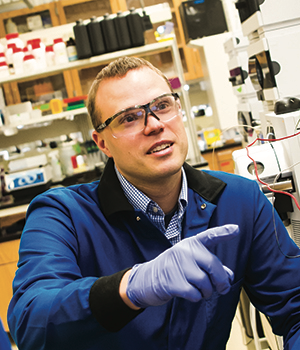
Bradley Olsen
(he/him)
Chemical Engineering
Creating space for everyone
Bradley Olsen motivates his students to work diligently and aim for high-quality results and in the words of one student, “he also cares for our wellbeing.”
Associate Professor in the Department of Chemical Engineering, Olsen earned his B.S. in Chemical Engineering from MIT and his PhD in Chemical Engineering from University of California-Berkeley. Before returning to MIT, he completed a postdoctoral fellowship at the California Institute of Technology. His lab today has eight postdoctoral researchers and fifteen graduate students, along with many undergraduate and visiting students. In the Olsen lab, graduate students work to design materials that address important challenges, and to understand the fundamental science that is necessary for materials design. Olsen lab work includes the engineering of new biofunctional and bioinspired materials, and understanding the novel polymer physics required to control the nanoscale structure and the properties of these complex systems.
Supporting balance & a broader view
Olsen recognizes that balancing life in graduate school is difficult. He notes that faculty members and graduate students share the same basic stressors, such as home responsibilities, deaths in the family, concerns with their health, and of course a lot of work. Olsen says that seeing faculty members as “fallible human beings like everyone else,” can make it a lot easier for graduate students to relate to faculty members and even see their own challenges reflected back to them.
Olsen motivates his graduate students to work diligently and aim for high-quality, high-impact results, and he cares for their overall wellbeing. One student nominator writes that in addition to giving pointers on approaching the work, Olsen ensures time for non-work related activities to decompress. One advisee says that Olsen “values mental health as a priority for all of his students and postdocs.”
Olsen always encourages his students to approach him if they have any issues with research, classes, or grad school life more broadly. Whether or not things are going well, he actively schedules meetings with his graduate students to check in (a Mentoring Guidepost identified by the C2C program). One student nominator deeply appreciated his efforts to initiate follow-up meetings when Olsen knew that a student needed more support.
Beyond the lab, Olsen demonstrates a commitment to improving society. “He often sends out ‘social justice’ emails to the group,” one student said. For example, Olsen called attention to the unfair wages allotted to drivers on ride-sharing apps. To pay the drivers fairly, Olsen developed a new protocol for his students when using ride-sharing apps for research-related travel.
His attention to social justice extends well across the globe. “One of my favorite things is the MIT-Brazil program,” Olsen notes. His work through MIT-Brazil has included leading workshops for MIT students abroad and teaching as a visiting professor at Universidade Estadual de Campinas. Olsen notes that this work has catalyzed for him both “a remarkable humanistic awakening and a huge transformation in terms of the science that my lab will be doing five years from now.”
Learning from others
In the Olsen lab, graduate students and post-docs participate in small focus groups where a number of important topics are discussed including mental health, women in science, and sexual harassment. During a meeting on sexual harassment, one student noted that Olsen encouraged the group to come up with ways to make MIT more welcoming to individuals who are victimized by sexual harassment. “He also defined for us sexual harassment and how to recognize it,” the student said. This discussion provided an opening for lab members to discuss how to stop sexual harassment in our workplace and community.
Following the release of a departmental diversity report, Olsen noted that the department still had a long way to go to achieve enrollment gender balance. Olsen initiated a focus group particularly for women in the lab where they discussed gender balance in the field and their collective experiences.
When asked how he supports diversity in his lab, Olsen remarked, “I believe deeply that talent comes from everywhere, in different forms, and I really want to have the privilege of working with the best talent.” For him, it’s the people that set MIT apart. “I feel really blessed to receive a diverse mix of talent, and I think that in choosing from that it’s natural to end up with a diverse team.”
Olsen says that over the years he has had the privilege of having many wonderful mentors. Olsen says that his graduate advisor, Rachel Segalman (UCSB) pushed him to excel and still mentors him today. Olsen recalls that Julie Kornfield, one of his post-doctoral advisors, (CalTech), taught him to forgive himself. “At the time,” Olsen says, “this sounded like a vote of no confidence from her, but it’s some of the best advice I’ve ever had.” Other sage wisdom has come from David Tirrell (CalTech) who convinced Olsen to come to MIT, Ned Thomas (MIT emeritus) who taught him the value of MIT, and Zhen-Gang Wang (CalTech) who taught Olsen “how to deconstruct the physical world into its fundamental essence.”
Describing his own advising style, Olsen says “I sincerely wish I had a system, something with a catchy book-like title, but it’s really controlled chaos.” Olsen aims to do his very best to fulfill the expectations put on him by others and by himself. Along the way, he tries be completely transparent about how things are going, and to apologize when necessary. The goal he says is continuous improvement and continuous learning. “We do not aspire to be perfect, but we should always strive to grow,” Olsen says.
